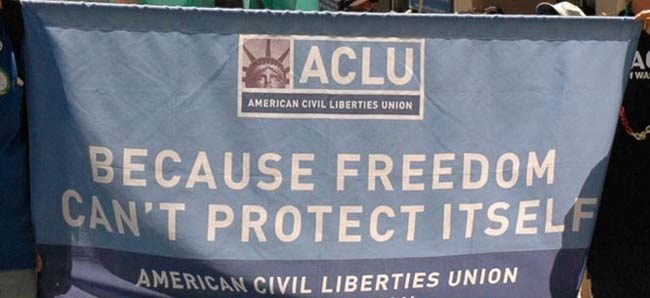
July 2, 2018; New York Times
In last Sunday’s New York Times Magazine, Joel Lovell describes the ACLU’s strategy to spend all of the money the public has entrusted to them to protect our civil liberties and constitutional rights. The whole article is well worth a read. But first, as NPR’s Marketplace hosts say, let’s deal with the numbers.
First, the ACLU’s “card-carrying” membership has grown from 400,000 to 1.84 million so far during the course of Trump’s presidency. And while it usually brings in an average of $3-$5 million each year, during these first excruciating 15 months it has raised almost $120 million in online donations.
The money is being well spent; the ACLU has launched 170 “Trump-related legal actions” since the president took office, a record for the organization over any equivalent time period. There have been more than 87 law suits filed.
Executive director Anthony Romero wants to have 500 lawyers nationwide by 2019, and that is in part what the organization is spending its newfound cash on. “That’s bigger than we’ve ever been,” says Romero. “But let’s not lose sight of reality: There are 11,000 lawyers in the Department of Justice. Eleven. Thousand…We’re the biggest of the advocacy groups, but even if we go from 300 to 500 lawyers, we are still tiny. The power of the federal government can’t be overestimated.”
The ACLU prepared for the explosion of need for its role. Romero had requested briefing documents on the civil rights positions of each of the candidates during the campaign, insisting on a Trump briefing even when others thought it was pretty much a waste of time, since there was no way he would win. That meant the organization was indeed ready right out of the gate. Three days after the election, they released a statement that was printed as a full-page ad in the New York Times, calling Trump a threat to the constitution. “You will have to contend with the full firepower of the ACLU at your every step,” the group declared, not yet knowing the support they would garner on that resolve.
Sign up for our free newsletters
Subscribe to NPQ's newsletters to have our top stories delivered directly to your inbox.
By signing up, you agree to our privacy policy and terms of use, and to receive messages from NPQ and our partners.
But the group knows it cannot depend upon a purely legal strategy to develop the public support needed to protect human and civil rights in the US. Lovell writes,
Right after the election, [Romero] hired a new national political director, Faiz Shakir, whose job would be to figure out how to mobilize all of those people looking to the ACLU for help. “The day after the election, American people started voting again,” Shakir told me. “With their pocket books and their email addresses, telling the ACLU: ‘Tag, you’re it.’ My take on that was, keep doing what you’re doing, litigation is great, but you have to rethink what your mission is.”
Shortly after Shakir started his new job, he predicted that “we will see levels of cowardice and cynicism that will be awe-inspiring. As long as Trump doesn’t start offending the evangelical base or step on a land mine when it comes to Israel, they’re going to let him do whatever he wants.” But, he said, “it will be easier for Trump to hurt the people he promised to hurt than to help the people he promised to help,” and to Shakir that meant there was a strategic opening to engage people. He got to work building an organizing infrastructure that could be shared, and hired some of the great digital volunteers who came out of the Sanders campaign. “I hired people who know how to do this,” he said. “Out of the chaos that was the Bernie campaign was born a structure and a movement of people.”
The ACLU is also expecting to spend money through its political arm, on campaigns where wins can be had with hard work. Romero explained what is different now and what points need to be driven home—what values upheld:
We’re now looking at down-ballot races and thinking in terms of how we frame civil rights and civil liberties in each election. If you asked the Democratic National Committee to look at our 2018 plan, they would scratch their heads in confusion. They would say, Why are you wasting money on states or races that are not in play? But for us the question is: What are the races that allow us to put a spotlight on civil rights and civil liberties? We want to surgically target the down-ticket races and show that getting information to the public and activating a base can have a real impact.
The ACLU, of course, has lately been a relatively well-funded organization in regular times, but its donor base is described here as largely holdovers from the Nixon years—in other words, older folk. Its capacity to ramp up on a dime when needed, however, is a powerful image of how democracy can prove itself through this sector.—Ruth McCambridge












